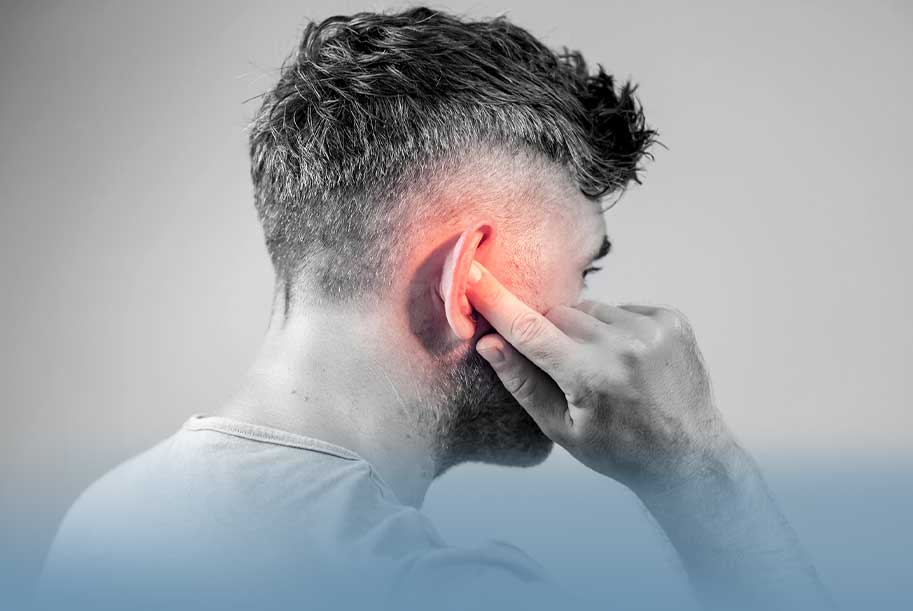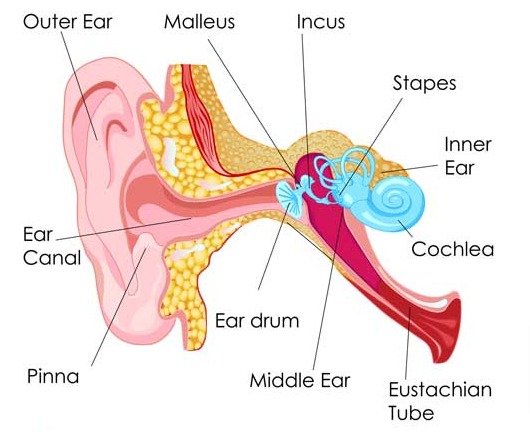
Tinnitus
Tinnitus fills your ears with sound no one else hears. It’s a common problem affecting more than 50 million people in the United States. Tinnitus can be severe, affecting people’s daily lives. Tinnitus isn’t a disease. It’s a symptom of several medical conditions. Healthcare providers can’t cure tinnitus but they can help manage its impact.
What is tinnitus?
If you have tinnitus, your head is filled with sound — ringing, whistling, clicking and roaring — that no one else hears. Tinnitus (tin-NITE-us or TIN-ne-tus) can be sounds that are so soft you may not notice them or so loud they block out sounds coming from external sources.

Is tinnitus common?
Tinnitus is a common problem that affects more than 50 million people in the United States. For about 12 million Americans, tinnitus is a constant and noisy companion that affects their daily lives. People who have tinnitus may have trouble sleeping or concentrating. Living with tinnitus can make people feel angry, frustrated and depressed.
What are the first signs of tinnitus?
You may first notice tinnitus because you’re developing hearing loss, have a head injury or an everyday medical condition like an ear infection.
Does tinnitus ever go away?
Healthcare providers may be able to cure tinnitus by treating the underlying condition. When they can’t, they recommend tactics to reduce its impact.
SYMPTOMS AND CAUSES
What causes tinnitus?
Healthcare providers don’t know exactly what causes tinnitus. They think abnormal activity in the part of your brain that processes sound may be responsible for tinnitus, but they don’t know how or why, or how to prevent that activity.
What conditions have tinnitus as a symptom?
- Aging. Age-related hearing loss (presbycusis) affects 1 in 3 adults over age 65.
- Exposure to loud noises or explosions. This can happen over time or from a single incident. Exposure to very loud music or working in a very noisy environment can cause hearing loss and tinnitus.
- Ototoxic medications. There’s a wide range of medications that can damage your ears. If you’re concerned about tinnitus, ask your healthcare provider about medication side effects and alternatives.
- Ménière’s disease. This chronic ear disorder affects your balance and hearing.
You can have tinnitus without hearing loss. Providers link tinnitus to about 200 different health conditions. Here are some examples:
- Temporomandibular joint disorder (TMJ). Tinnitus is a common symptom of TMJ, which is a condition caused by inflammation or irritation of the muscles and joints.
- Foreign objects in lodged in your ear. Sometimes foreign objects like pens or pencils used to clean ears end up rupturing eardrums.
- Excessive earwax (cerumen). Earwax can block your ears and affect your hearing.
- Allergies. Congestion from allergies can affect your eustachian tube. This tube connects your middle ear and the back of your nose. Congestion that blocks eustachian tube can keep sound from getting to your ear.
- Vestibular schwannoma (acoustic neuroma). This benign (non-cancerous) tumor affects the nerves that connect to your brain and manage balance and hearing. People who have neurofibromatosis type 2 often have vestibular schwannomas.
Otosclerosis. This is a growth in your middle ear.
MANAGEMENT AND TREATMENT
How do healthcare providers treat tinnitus?
Tinnitus isn’t a condition or disease. It’s a symptom of other conditions. Here are some steps your provider may take to learn more about your tinnitus:
Physical examination.
They’ll check your ears for any obvious problems. They may check for signs of pulsatile tinnitus.
Medical history.
They may ask if other family members have hearing loss, if you spend a lot of time around loud noises or a loud noise from a single event. They may ask what medications you take.
Hearing test (audiometry).
This test checks your ability to hear a range of tones, displaying your results in an audiogram.
Tympanometry.
Your provider checks your eardrum with a handheld device called a tympanometer that shows your results in a tympanogram.
Magnetic resonance imaging.
This test produces detailed images of your body without using X-rays.
What happens if I don’t have a medical condition?
If your healthcare provider has ruled out medical conditions apart from hearing loss, their next step is recommending ways to manage the impact of tinnitus on your life. Here are some examples:
- Hearing aids. Many people who have tinnitus also have hearing loss. Hearing aids may help provide relief from tinnitus by making sounds louder and the tinnitus less noticeable. For example, hearing aids may increase the volume of soft sound in your environment, like the noise made by your refrigerator. Obviously, hearing aids make it easier for you to hear, which may make it easier for you to ignore tinnitus.
- Sound generators. These devices produce and deliver sounds to your ears that mask tinnitus. For example, the sound generator may deliver soothing sounds like a shower or quiet rain. Some people may benefit by using hearing aids that include sound generators.
- Environmental enrichment devices. You can create your own way of masking tinnitus. Tabletop sound machines that generate soothing background noise, recordings of music, nature or other sounds or apps for smartphones and tablets can make tinnitus less noticeable.
- Relaxation techniques. Tinnitus can be frustrating and stressful. Stress and frustration may make tinnitus more noticeable. Learning techniques to increase relaxation and ease stress can help people better deal with the frustrations of tinnitus.
- Counseling options. Some people benefit from mental wellness therapies like cognitive behavioral therapy (CBT) or acceptance and commitment therapy (ACT). These therapies help people learn how to pay less attention to tinnitus.

PREVENTION
How can I prevent tinnitus?
Protecting your hearing is one of the best ways to avoid tinnitus. Start protecting your ears by thinking about all your regular activities. You may not realize all the ways you expose your ears to loud noises and sounds. Here are some potential activities that may affect your hearing:
At your workplace.
You may work in construction, landscaping or around loud machinery like an assembly line. Protect your hearing with earplugs.
At exercise class.
Many gyms play loud music to motivate and move people through exercise. If that’s your situation, use earplugs to protect your ears. At the very least, do your workout away from the music’s source.
At concerts and movie theatres.
This is another time it makes sense to use earplugs.
Earbuds
Any time you use earbuds with your volume turned all the way up. Protect your ears by keeping the volume low.